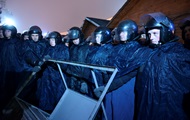Uncompromising commitment to police state tactics

Western reports of major concessions from Yanukovych are misleading. It is excellent that the Jan 16 anti-protest laws were revoked, however repressive police measures had already been slipped in through ministerial or Cabinet of Ministers decrees, and the president then played a key role in hijacking the adoption of a real amnesty law
An Interior Ministry order № 1011 on the use of the special force Berkut unit signed into force on Jan 28, together with four Cabinet of Ministers’ decrees from Jan 22, have significantly extended Berkut’s powers and the likelihood of their deployment against peaceful protesters.
It is worth noting that some of the changes date back to October. They were not, therefore, response to the first serious confrontations between protesters and Berkut and/or interior ministry forces on Hrushevsky St. These began on Jan 19, two days after the president, Viktor Yanukovych signed into force laws that placed any peaceful protest by definition outside the law.
The new measures introduced without public or parliamentary discussion have now extended the special equipment Berkut officers may use. Two extra hand gas grenades and three stun grenades have been added, as well as rocket-propelled devices (Dzhmil and Dzhmil-M) which can fire either gas or incendiary material; tear gas, armored cars and others. A particularly ominous amendment comes in Decree No. 14 The new version removes previous temperature restrictions on the use of water cannons as a form of riot control. Given that the protests are taking place in temperatures of minus 10 or even lower, this is a highly retrograde step. One veteran EuroMaidan protester, Bohndan Kalynak may well have died of pneumonia as a result of this “crowd control” method.
If the Interior Ministry document lists grounds for deployment of Berkut officers that roughly correspond with those in countries with well-established democracies, the Cabinet of Ministers’ decrees give broad scope for abuse.
According to Decree No. 12, police bodies receiving “information about possible infringements of public order; the threat of extremist activities; violation of legislation during rallies; meetings; street processions and demonstrations carry out such additional measures in order in order to safeguard civil and human rights and liberties and the normal functioning of state bodies of power may temporarily restrict the use of vehicles and / or access of cities to particular buildings or areas”.
The Jan 19 anti-protest laws were widely condemned as repressive and clearly aimed at preventing legitimate protests taking place in the country, including the AutoMaidan car processions. The ministerial measures have the same overt purpose with the decision as to what is considered “extremist activities” left to their discretion.
There are also credible reports that the Cabinet of Ministers has decided on a six-fold increase in the numbers of Berkut and Grifon (court police) officers.
Two words have entered the English language in connection with recent events in Ukraine: “Berkut” and “titushki”. Berkut officers earned notoriety over the brutal dispersing of entirely peaceful protesters during the early hours of Nov 30. “Titushki” or hired thugs have recently been seen working in close coordination with Berkut or other police officers. Ukraine’s leaders cannot take the credit for trying to stigmatize civic organizations as “foreign agents”. Here, as with other measures in the Jan 19 laws, they were slavishly following Russia, and the past tense is not necessarily appropriate. Pro-presidential Party of the Regions MP Vadym Kolesnichenko has already managed to register draft bills that would reinstate this “innovation’ of the Jan 19 laws.
Berkut behavior, especially though not only on Nov 30, is in fact one of the reasons why the “amnesty law” passed on Jan 29 can hardly be considered a “compromise decision” as Human Rights Ombudsperson Valeria Lutkovska so bafflingly followed the president in calling it.
A more detailed report on the law can be found here. Briefly, the law would absolve all those involved in the protests of criminal liability, with this including Berkut officers and those who issued the orders to savagely disperse peaceful protesters.
Reports from MPs’ assistants and a perusal of the other “amnesty bills’ on offer indicate that on Jan 29 even many Party of the Regions MPs were willing to support a real amnesty bill (with or without inclusion of Berkut officers). Yanukovych however appeared in parliament and spent two hours threatening members of the ruling majority with at least dissolution of parliament in order to get his law passed.
This law treats the considerable number of people in detention or facing criminal charges as hostages to be freed only if all protesters throughout the country effectively go home. It is seriously difficult to understand why they should do so, when all previous commitments, including in the first “amnesty bill” in force but not applied from Dec 25, have not been honored. It is no easier to fathom how anybody genuinely seeking resolution of this volatile situation could bandy about words like “compromise”.
The Jan 29 amnesty law could more realistically be called a delay tactic with 15 days having been given for – unlikely - compliance. Concurrent measures to increase Berkut capacity and intense Kremlin pressure to suppress protest have led some analysts to warn of possible action after that time, with at very least support from Russia. The argument is that the Sochi Winter Olympics will then be ending and calls for an international boycott too late. With an amnesty law convincing few and nothing to suggest the will to put aside repressive measures, the scenario cannot be rejected out of hand.
Photo: Korespondent.net





